Tan Kim Soon Henry and Tan Mion Jie Nigel
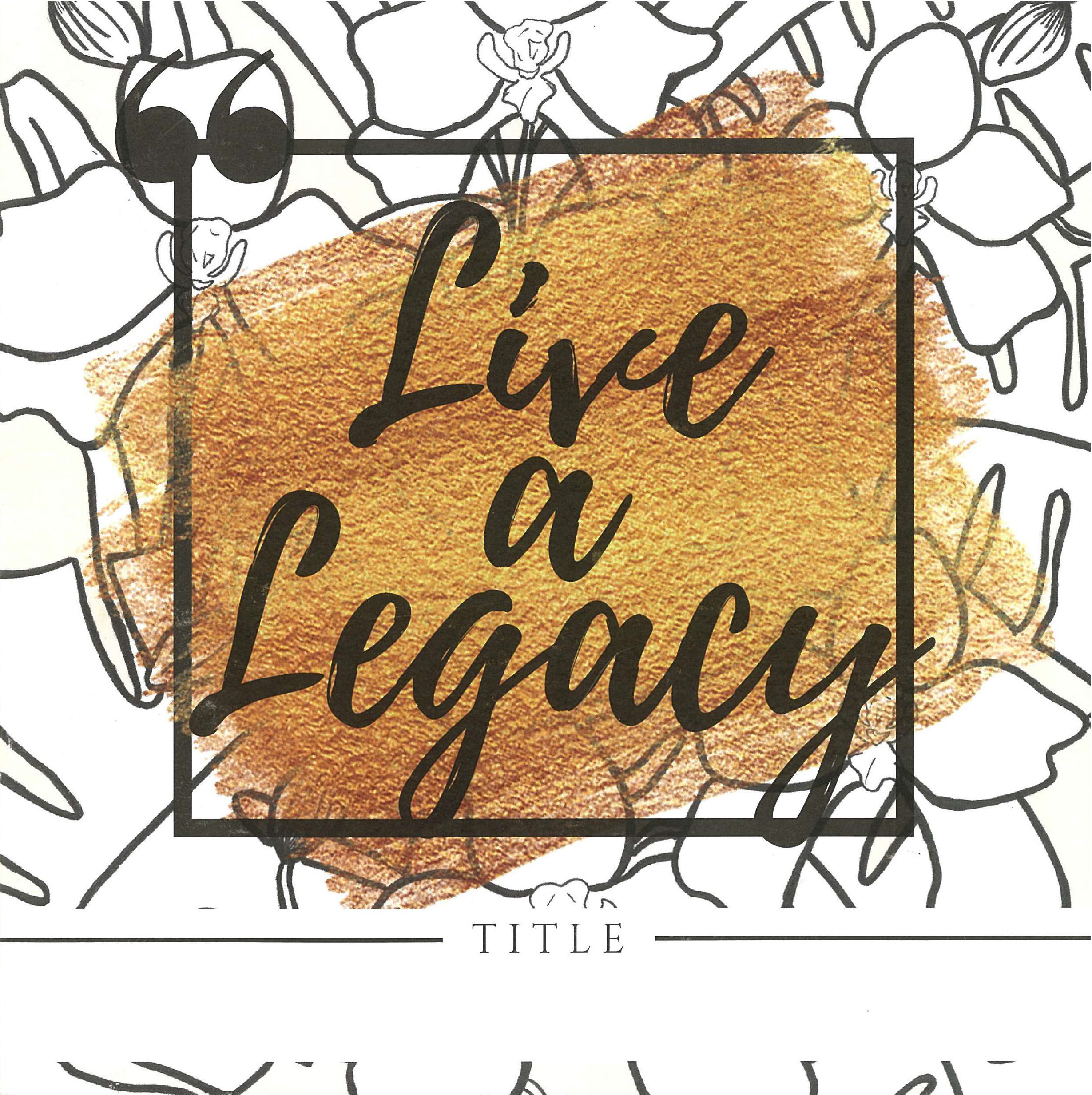
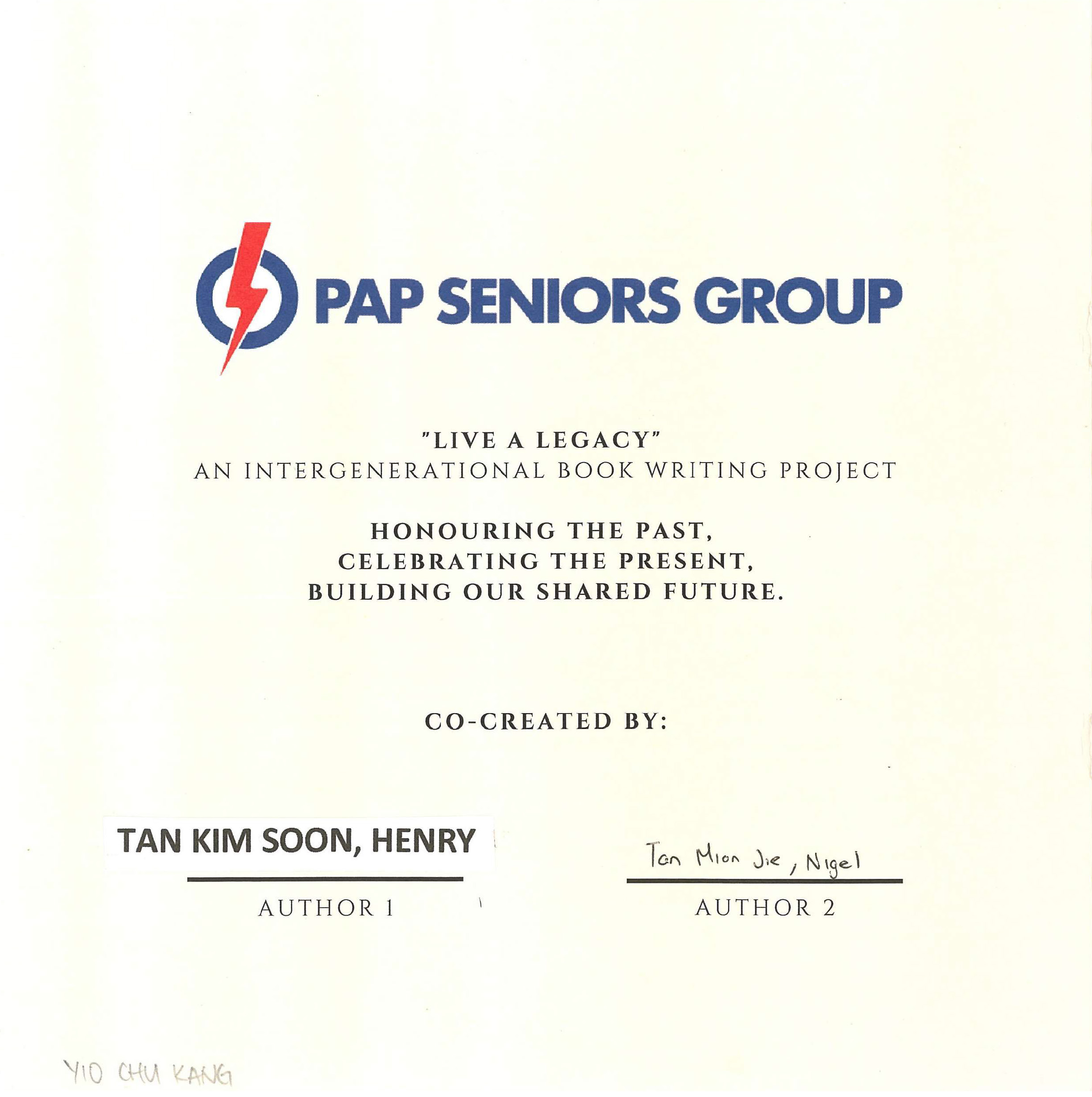
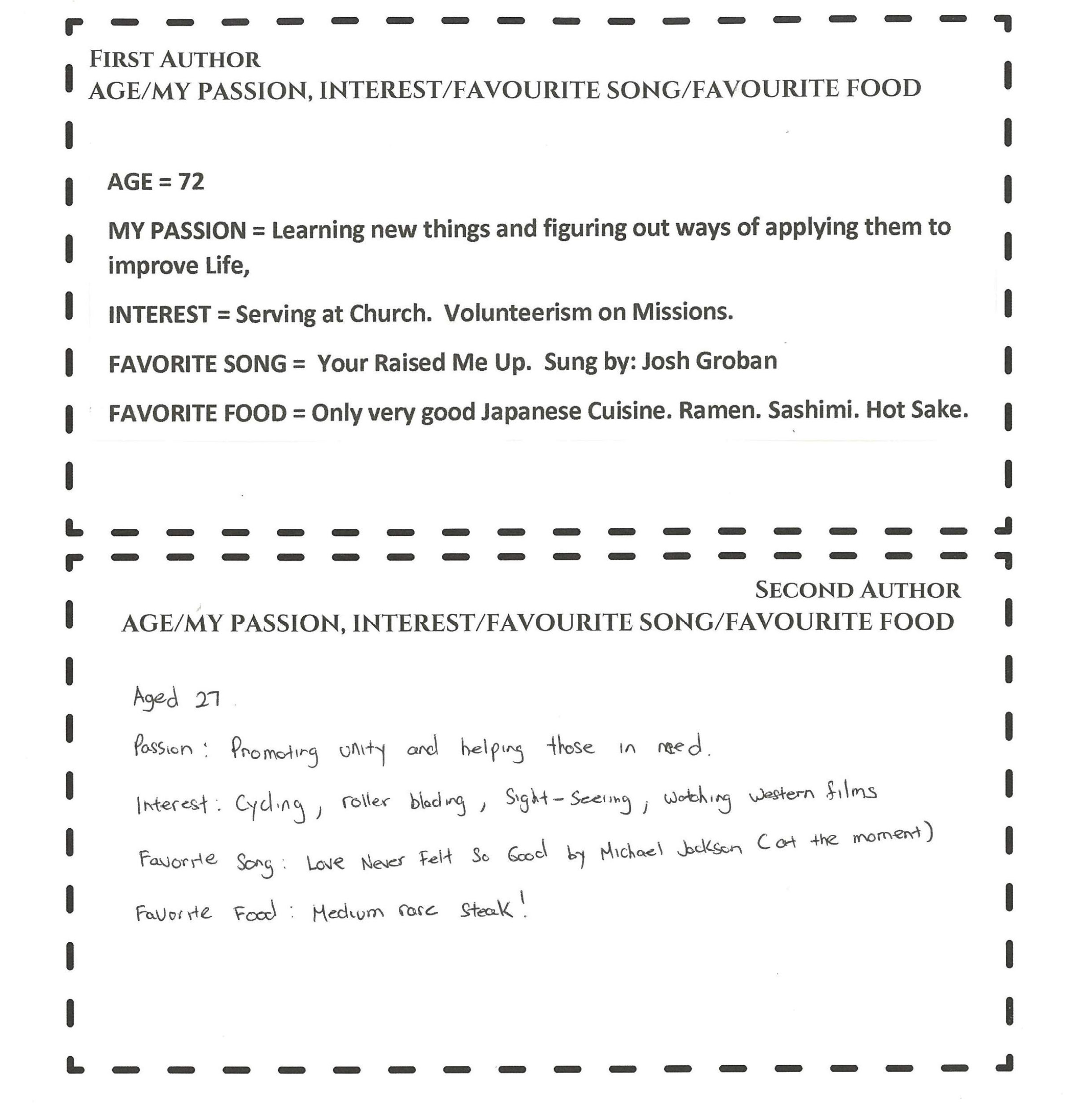
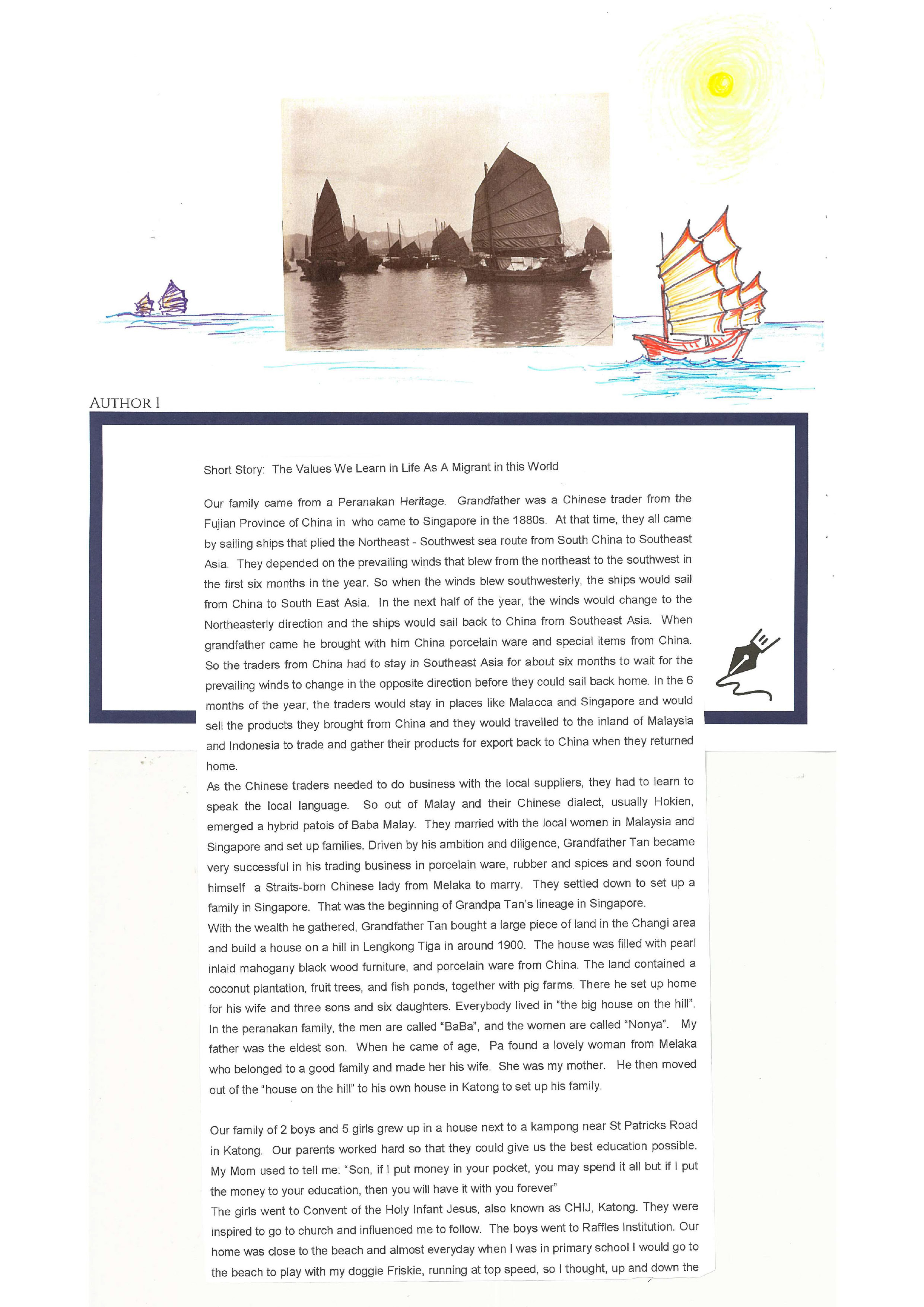
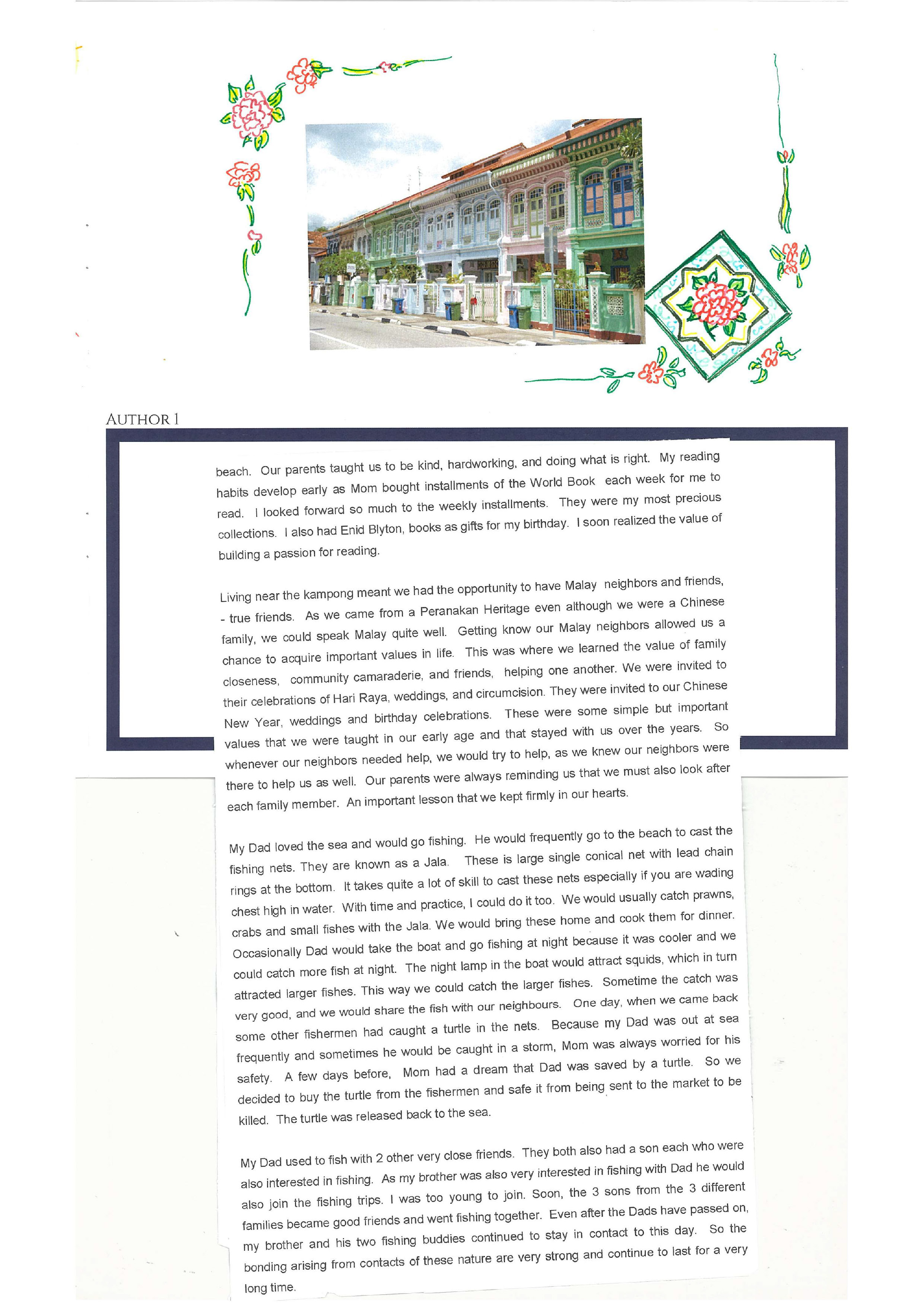
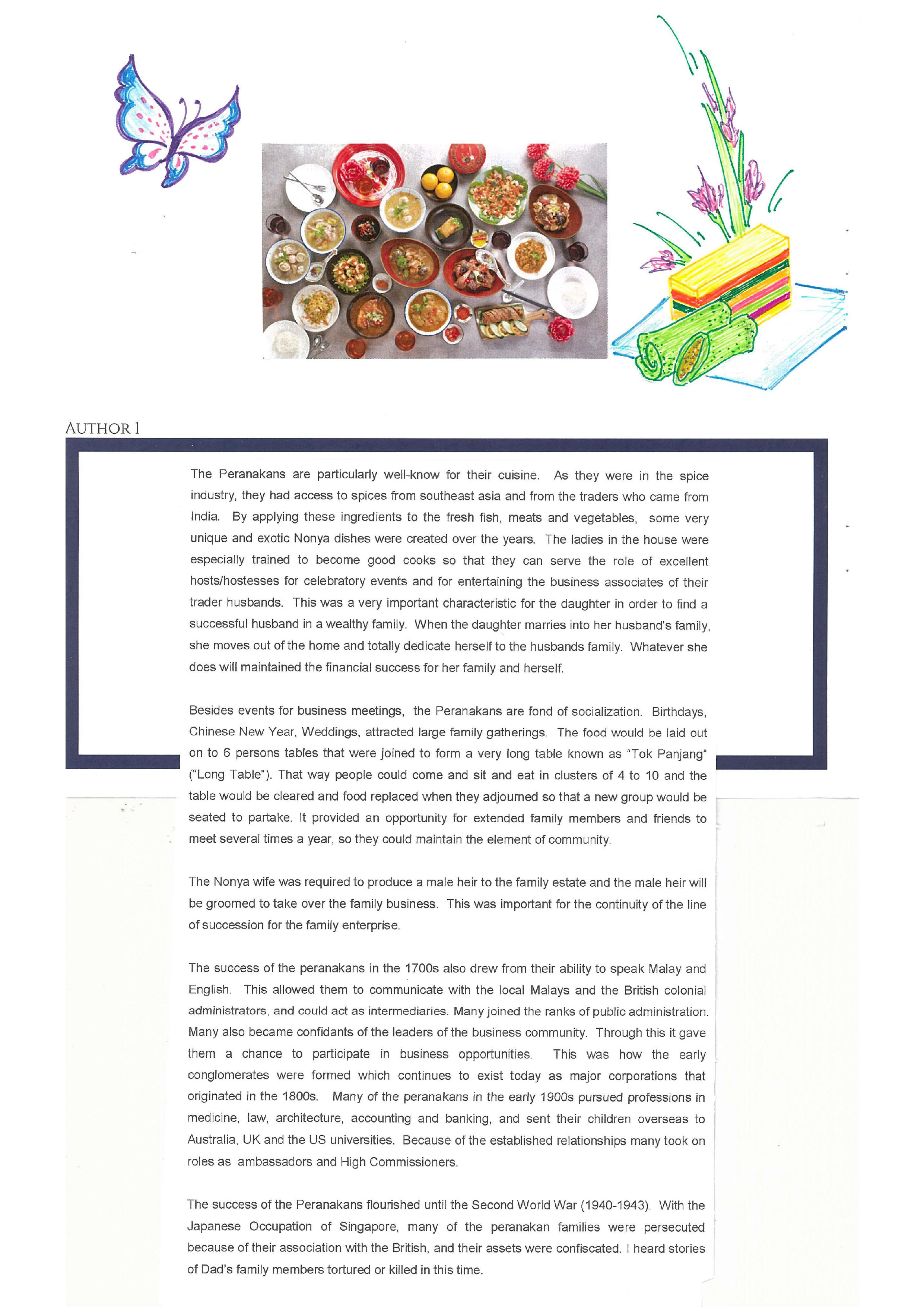
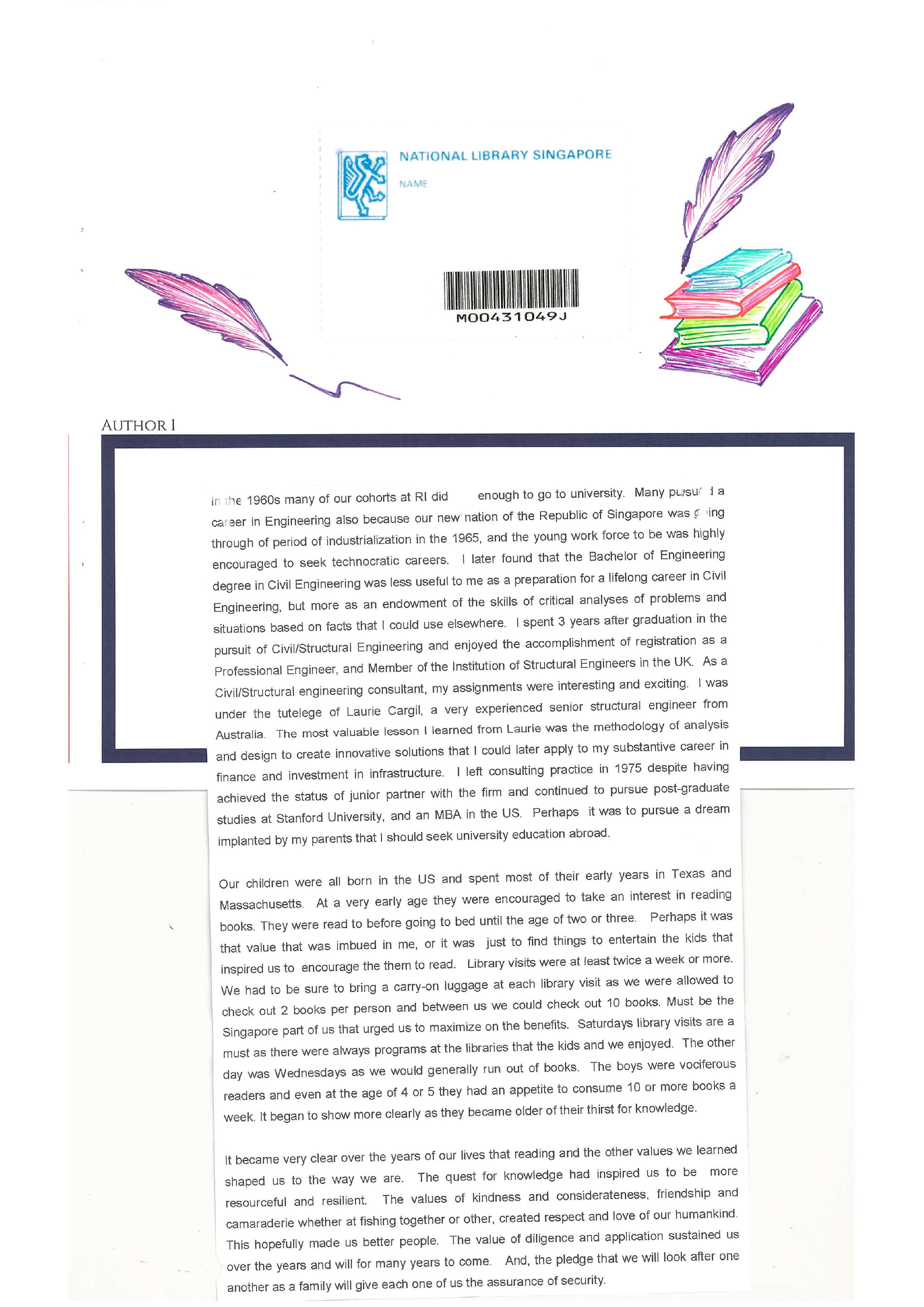

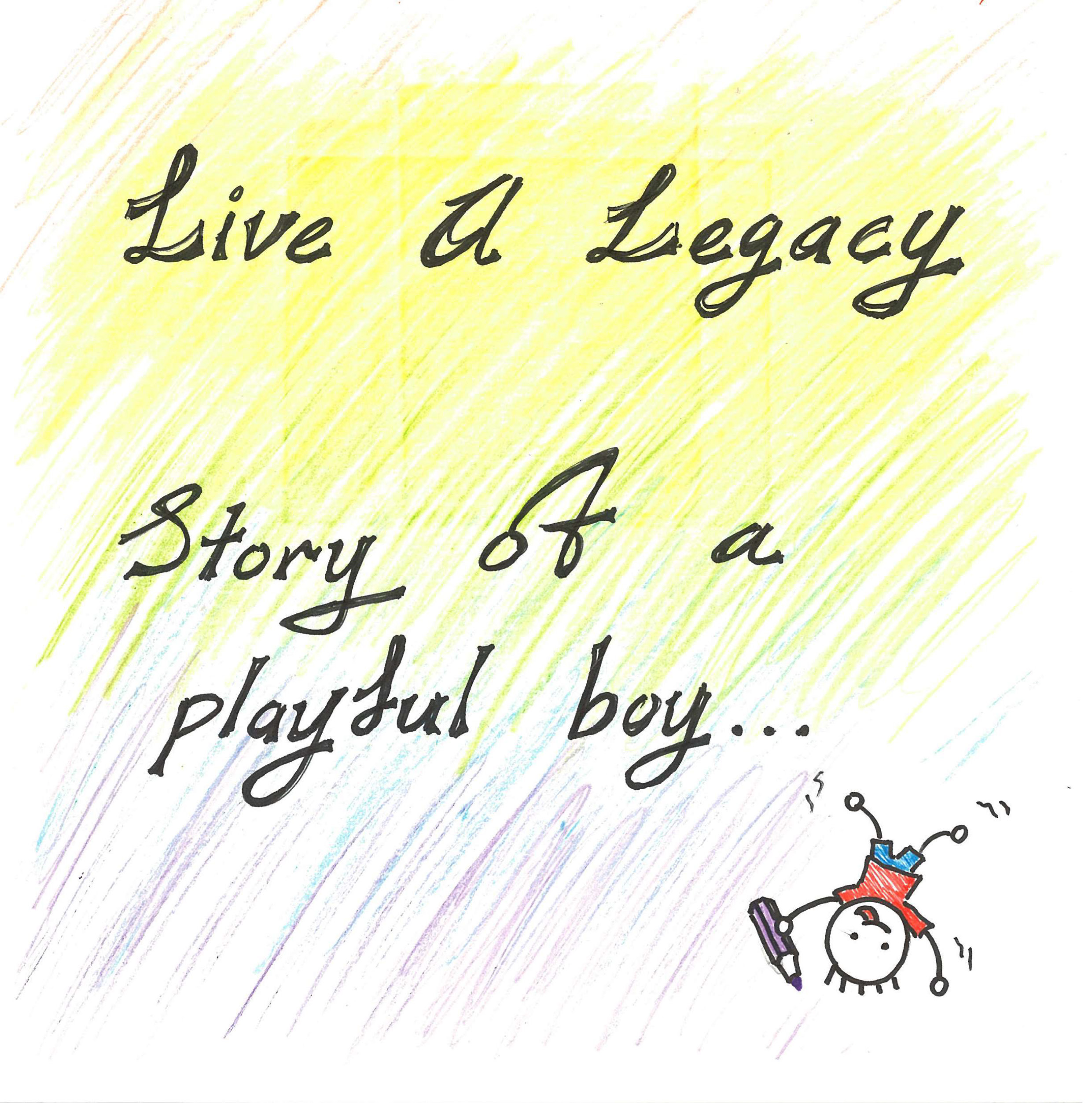
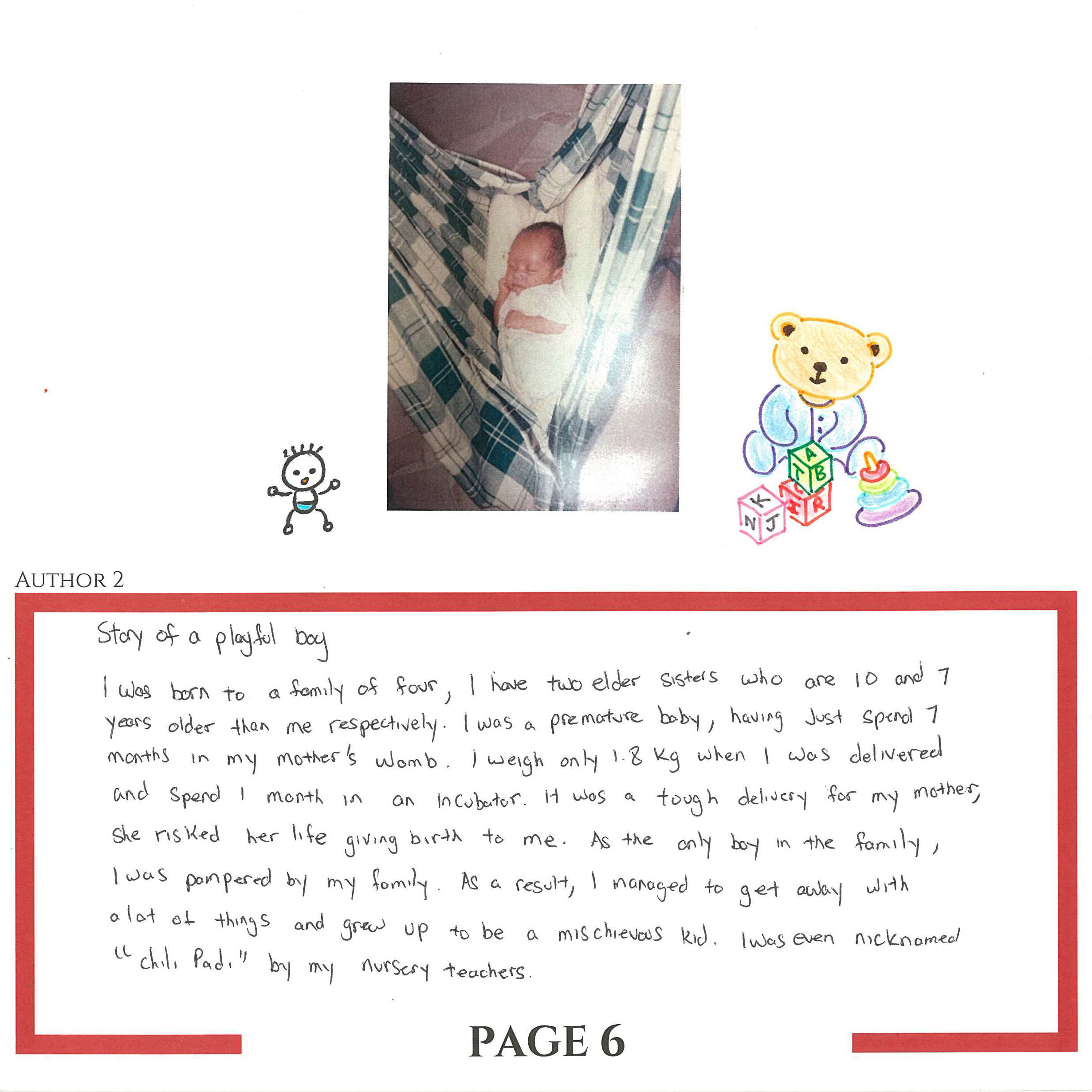
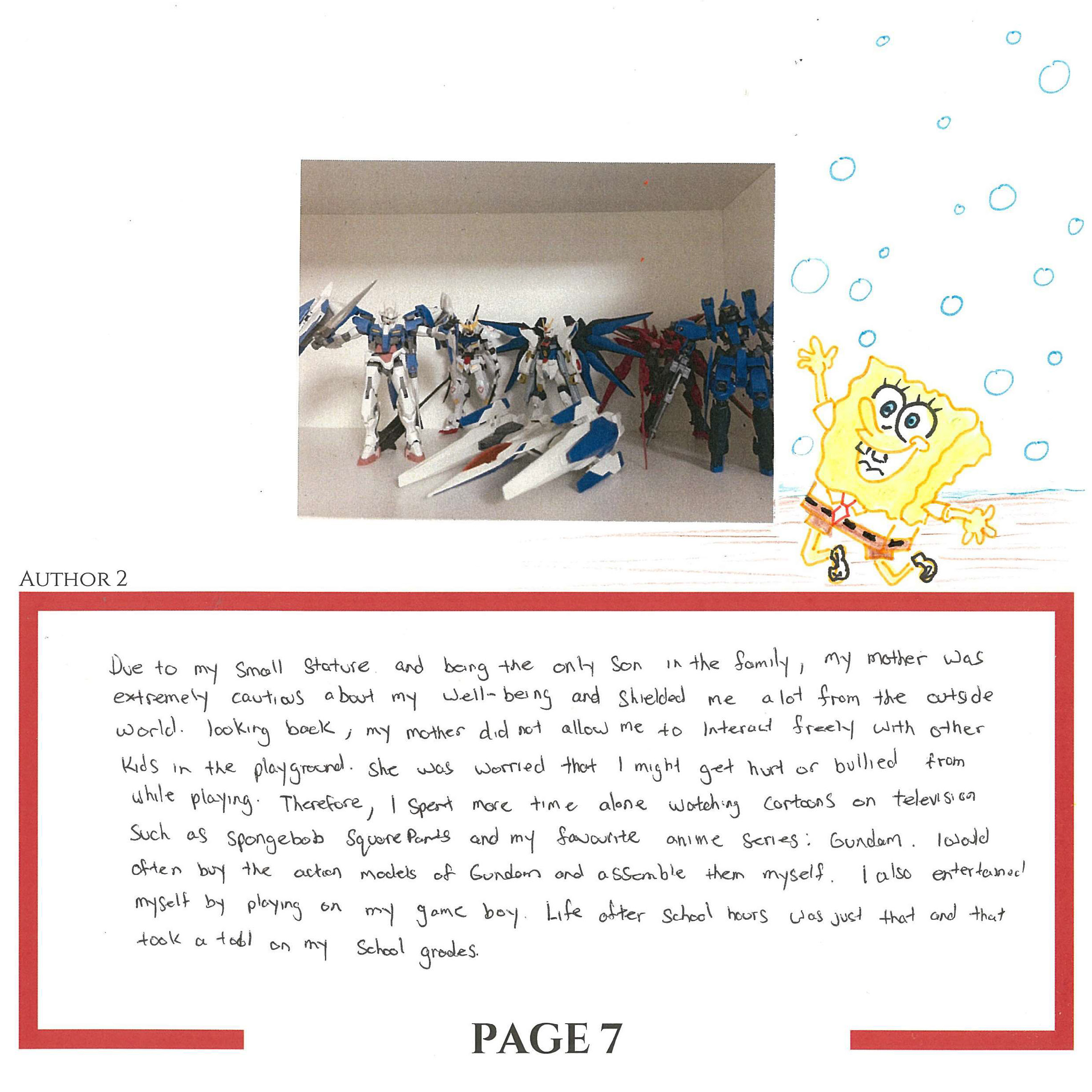
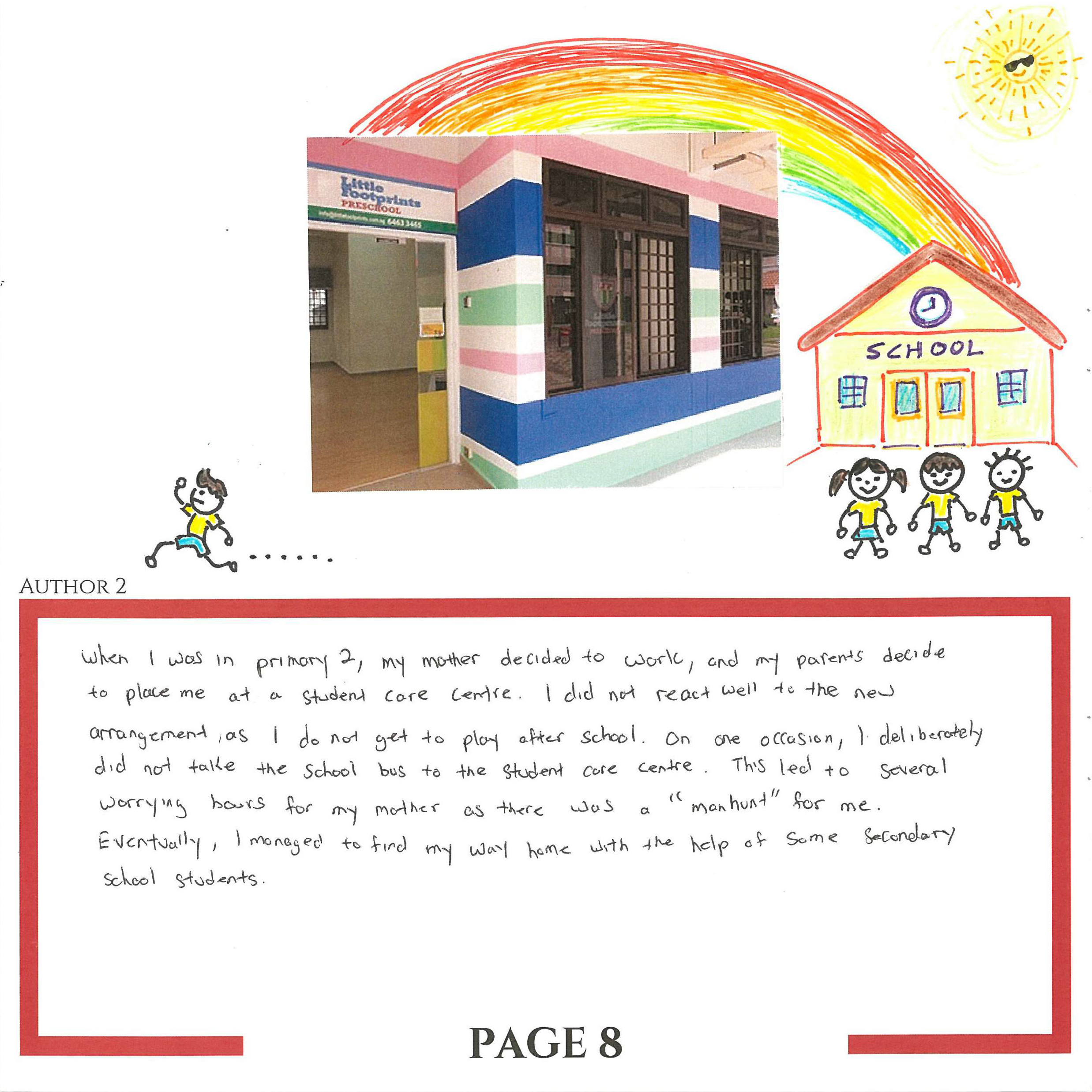
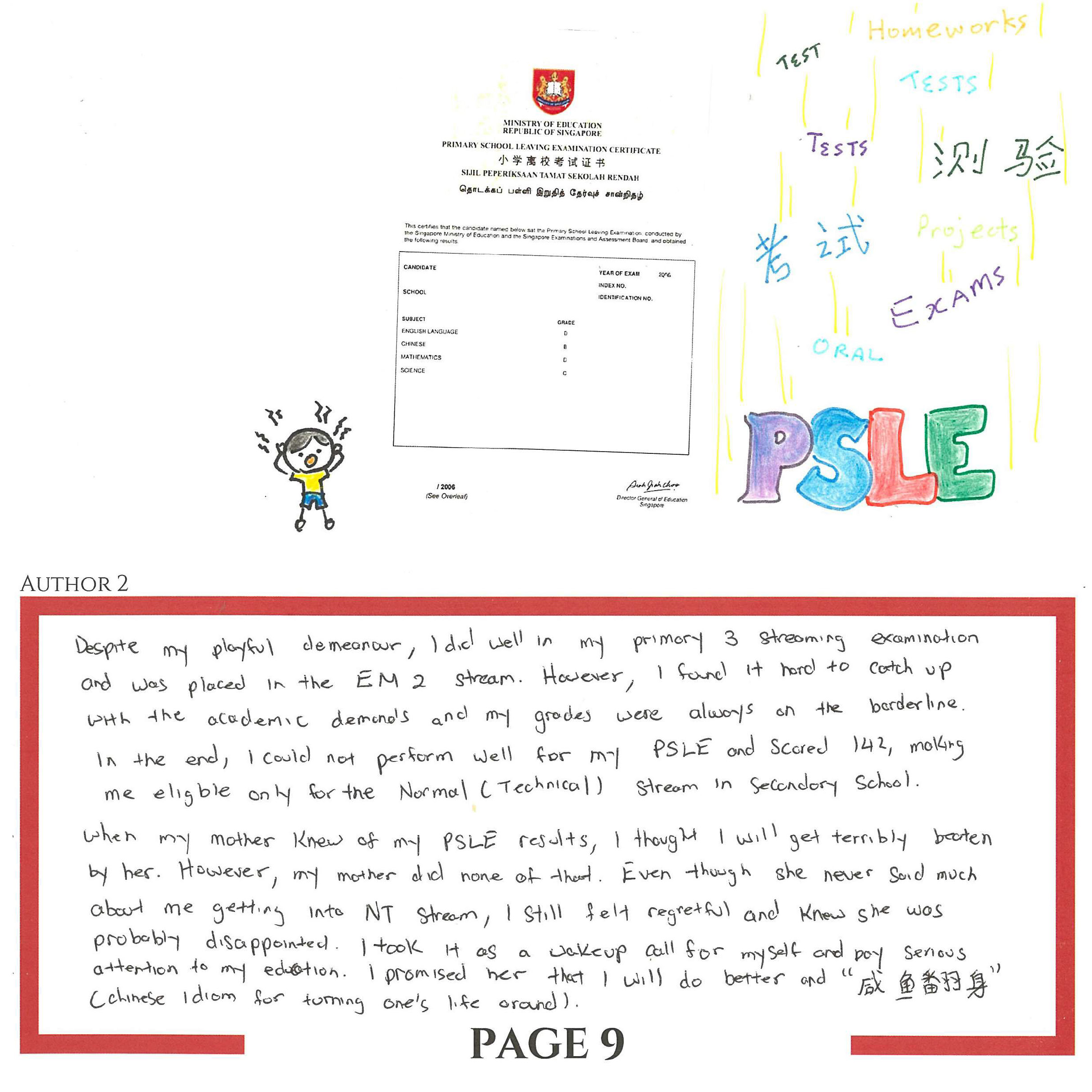
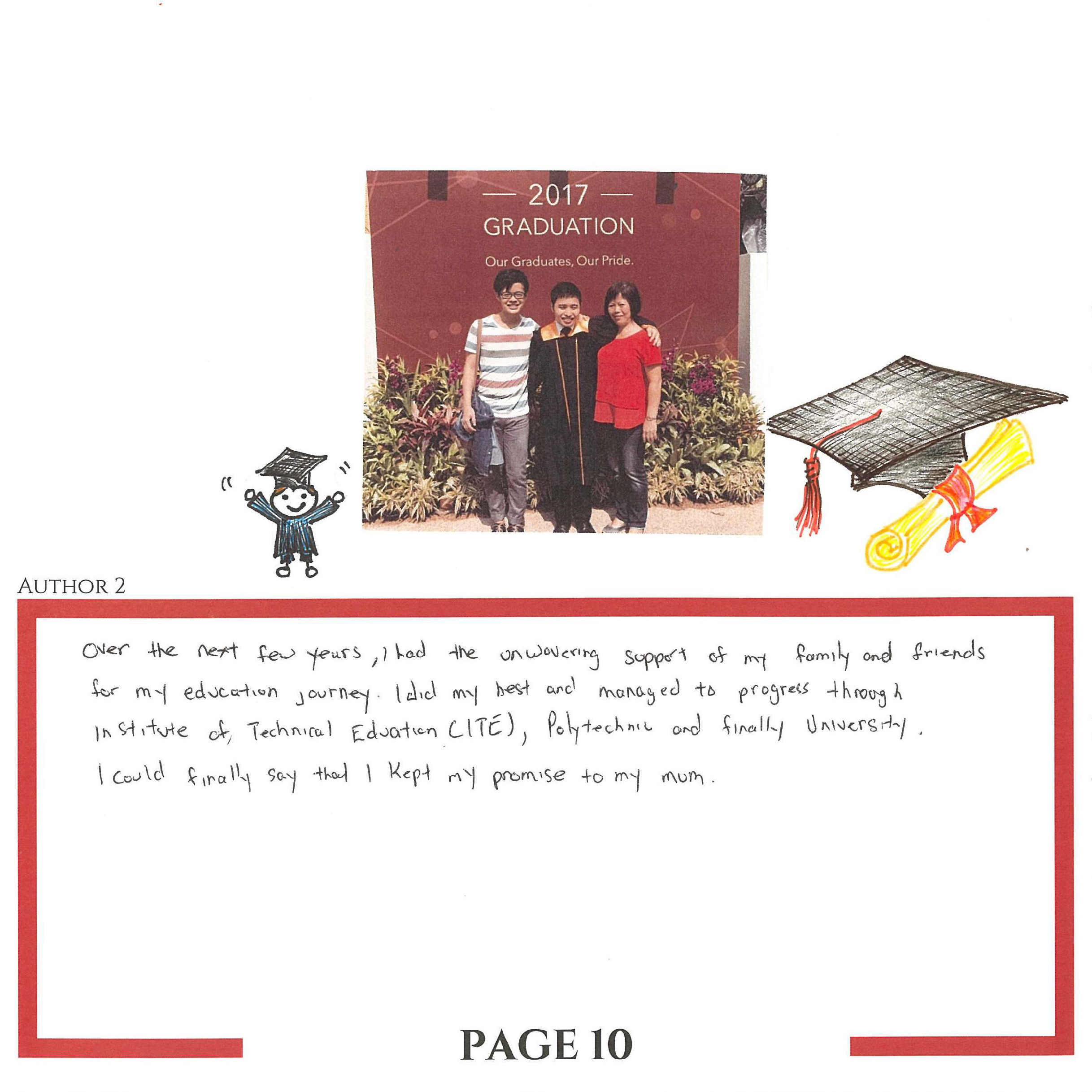
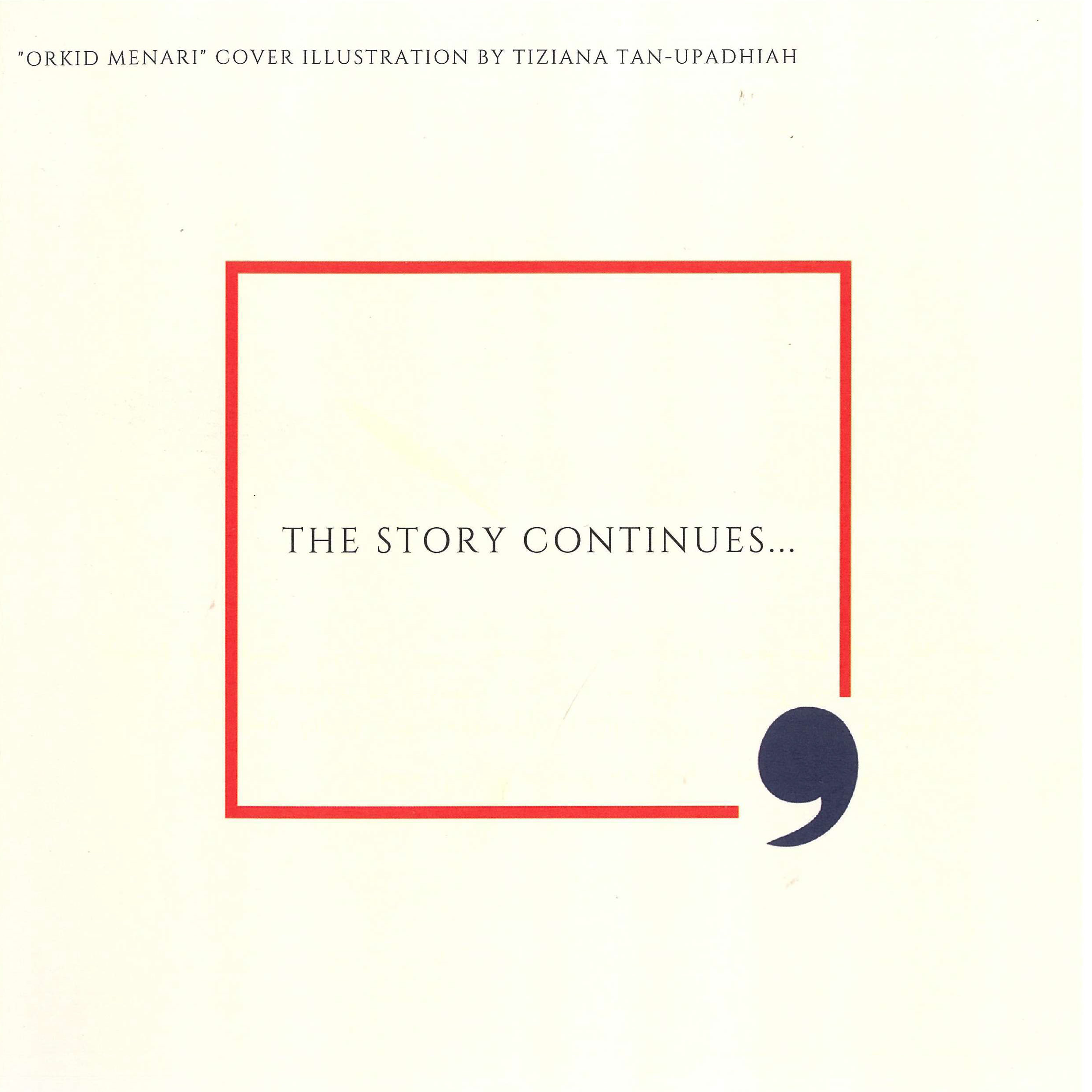

Tan Kim Soon Henry:
Short Story: The Values We Learn in Life As A Migrant in this World
Our family came from a Peranakan Heritage. Grandfather was a Chinese trader from the Fujian Province of China in who came to Singapore in the 1880s. At that time, they all came by sailing ships that plied the Northeast - Southwest sea route from South China to Southeast Asia. They depended on the prevailing winds that blew from the northeast to the southwest in the first six months in the year. So when the winds blew southwesterly, the ships would sail from China to South East Asia. In the next half of the year, the winds would change to the Northeasterly direction and the ships would sail back to China from Southeast Asia. When grandfather came he brought with him China porcelain ware and special items from China. So the traders from China had to stay in Southeast Asia for about six months to wait for the prevailing winds to change in the opposite direction before they could sail back home. In the 6 months of the year. the traders would stay in places like Malacca and Singapore and would sell the products they brought from China and they would travelled to the inland of Malaysia and Indonesia to trade and gather their products for export back to China when they returned home.
As the Chinese traders needed to do business with the local suppliers, they had to learn to speak the local language. So out of Malay and their Chinese dialect, usually Hokien, emerged a hybrid patois of Baba Malay. They married with the local women in Malaysia and Singapore and set up families. Driven by his ambition and diligence, Grandfather Tan became very successful in his trading business in porcelain ware, rubber and spices and soon found himself a Straits-born Chinese lady from Melaka to marry. They settled down to set up a family in Singapore. That was the beginning of Grandpa Tan's lineage in Singapore. With the wealth he gathered, Grandfather Tan bought a large piece of land in the Changi area and build a house on a hill in Lengkong Tiga in around 1900. The house was filled with pearl inlaid mahogany black wood furniture, and porcelain ware from China. The land contained a coconut plantation, fruit trees, and fish ponds, together with pig farms. There he set up home for his wife and three sons and six daughters. Everybody lived in "the big house on the hill". In the peranakan family, the men are called "BaBa", and the women are called "Nonya". My father was the eldest son. When he came of age, Pa found a lovely woman from Melaka who belonged to a good family and made her his wife. She was my mother. He then moved out of the "house on the hill" to his own house in Katong to set up his family.
Our family of 2 boys and 5 girls grew up in a house next to a kampong near St Patricks Road in Katong. Our parents worked hard so that they could give us the best education possible. My Mom used to tell me: "Son, if I put money in your pocket, you may spend it all but if I put the money to your education, then you will have it with you forever". The girls went to Convent of the Holy Infant Jesus, also known as CHIJ, Katong. They were inspired to go to church and influenced me to follow. The boys went to Raffles Institution. Our home was close to the beach and almost every day when I was in primary school I would go to the beach to play with my doggie Friskie, running at top speed, so I thought, up and down the beach. Our parents taught us to be kind, hardworking, and doing what is right. My reading habits develop early as Mom bought installments of the World Book each week for me to read. I looked forward so much to the weekly installments. They were my most precious collections. I also had Enid Blyton, books as gifts for my birthday. I soon realized the value of building a passion for reading.
Living near the kampong meant we had the opportunity to have Malay neighbours and friends - true friends. As we came from a Peranakan Heritage even although we were a Chinese family, we could speak Malay quite well. Getting to know our Malay neighbors allowed us a chance to acquire important values in life. This was where we learned the value of family closeness, community camaraderie, and friends, helping one another. We were invited to their celebrations of Hari Raya, weddings, and circumcision. They were invited to our Chinese New Year, weddings and birthday celebrations. These were some simple but important values that we were taught in our early age and that stayed with us over the years. So whenever our neighbors needed help, we would try to help, as we knew our neighbors were there to help us as well. Our parents were always reminding us that we must also look after each family member. An important lesson that we kept firmly in our hearts.
My Dad loved the sea and would go fishing. He would frequently go to the beach to cast the fishing nets. They are known as a Jala. These are large single conical nets with lead chain rings at the bottom. It takes quite a lot of skill to cast these nets especially if you are wading chest high in water. With time and practice, I could do it too. We would usually catch prawns, crabs and small fishes with the Jala. We would bring these home and cook them for dinner. Occasionally Dad would take the boat and go fishing at night because it was cooler and we could catch more fish at night. The night lamp in the boat would attract squids, which in turn attracted larger fishes. This way we could catch the larger fishes. Sometimes the catch was very good, and we would share the fish with our neighbours. One day, when we came back some other fishermen had caught a turtle in the nets. Because my Dad was out at sea frequently and sometimes he would be caught in a storm, Mom was always worried for his safety. A few days before, Mom had a dream that Dad was saved by a turtle. So we decided to buy the turtle from the fishermen and save it from being sent to the market to be killed. The turtle was released back to the sea.
My Dad used to fish with 2 other very close friends. They both also had a son each who were also interested in fishing. As my brother was also very interested in fishing with Dad he would also join the fishing trips. I was too young to join. Soon, the 3 sons from the 3 different families became good friends and went fishing together. Even after the Dads have passed on, my brother and his two fishing buddies continued to stay in contact to this day. So the bonding arising from contacts of these nature are very strong and continue to last for a very long time.
The Peranakans are particularly well-know for their cuisine. As they were in the spice industry, they had access to spices from southeast asia and from the traders who came from India. By applying these ingredients to the fresh fish, meats and vegetables, some very unique and exotic Nonya dishes were created over the years. The ladies in the house were especially trained to become good cooks so that they can serve the role of excellent hosts/hostesses for celebratory events and for entertaining the business associates of their trader husbands. This was a very important characteristic for the daughter in order to find a successful husband in a wealthy family. When the daughter marries into her husband's family, she moves out of the home and totally dedicate herself to the husband’s family. Whatever she does will maintained the financial success for her family and herself.
Besides events for business meetings, the Peranakans are fond of socialization. Birthdays, Chinese New Year, Weddings, attracted large family gatherings. The food would be laid out on to 6 persons tables that were joined to form a very long table known as "Tok Panjang" ("Long Table"). That way people could come and sit and eat in clusters of 4 to 10 and the table would be cleared and food replaced when they adjourned so that a new group would be seated to partake. It provided an opportunity for extended family members and friends to meet several times a year, so they could maintain the element of community.
The Nonya wife was required to produce a male heir to the family estate and the male heir will be groomed to take over the family business. This was important for the continuity of the line of succession for the family enterprise.
The success of the peranakans in the 1700s also drew from their ability to speak Malay and English. This allowed them to communicate with the local Malays and the British colonial administrators, and could act as intermediaries. Many joined the ranks of public administration. Many also became confidants of the leaders of the business community. Through this it gave them a chance to participate in business opportunities. This was how the early conglomerates were formed which continue to exist today as major corporations that originated in the 1800s. Many of the peranakans in the early 1900s pursued professions in medicine, law, architecture, accounting and banking, and sent their children overseas to Australia, UK and the US universities. Because of the established relationships, many took on roles as ambassadors and High Commissioners.
The success of the Peranakans flourished until the Second World War (1940-1943). With the Japanese Occupation of Singapore, many of the peranakan families were persecuted because of their association with the British, and their assets were confiscated. I heard stories of Dad's family members tortured or killed in this time.
In the 1960s many of our cohorts at RI did well enough to go to university. Many pursued a career in Engineering also because our new nation of the Republic of Singapore was going through of period of industrialization in 1965, and the young workforce to be was highly encouraged to seek technocratic careers. I later found that the Bachelor of Engineering degree in Civil Engineering was less useful to me as a preparation for a lifelong career in Civil Engineering, but more as an endowment of the skills of critical analyses of problems and situations based on facts that I could use elsewhere. I spent 3 years after graduation in the pursuit of Civil/Structural Engineering and enjoyed the accomplishment of registration as a Professional Engineer, and Member of the Institution of Structural Engineers in the UK. As a Civil/Structural engineering consultant, my assignments were interesting and exciting. I was under the tutelege of Laurie Cargil, a very experienced senior structural engineer from Australia. The most valuable lesson I learned from Laurie was the methodology of analysis and design to create innovative solutions that I could later apply to my substantive career in finance and investment in infrastructure. I left consulting practice in 1975 despite having achieved the status of junior partner with the firm and continued to pursue post-graduate studies at Stanford University, and an MBA in the US. Perhaps it was to pursue a dream implanted by my parents that I should seek university education abroad.
Our children were all born in the US and spent most of their early years in Texas and Massachusetts. At a very early age they were encouraged to take an interest in reading books. They were read to before going to bed until the age of two or three. Perhaps it was that value that was imbued in me, or it was just to find things to entertain the kids that inspired us to encourage them to read. Library visits were at least twice a week or more. We had to be sure to bring a carry-on luggage at each library visit as we were allowed to check out 2 books per person and between us we could check out 10 books. Must be the Singapore part of us that urged us to maximize on the benefits. Saturdays library visits are a must as there were always programs at the libraries that the kids and we enjoyed. The other day was Wednesdays as we would generally run out of books. The boys were vociferous readers and even at the age of 4 or 5 they had an appetite to consume 10 or more books a week. It began to show more clearly as they became older of their thirst for knowledge.
It became very clear over the years of our lives that reading and the other values we learned shaped us to the way we are. The quest for knowledge had inspired us to be more resourceful and resilient. The values of kindness and considerateness, friendship and camaraderie whether at fishing together or other, created respect and love of our humankind. This hopefully made us better people. The value of diligence and application sustained us over the years and will for many years to come. And, the pledge that we will look after one another as a family will give each one of us the assurance of security.
Tan Mion Jie Nigel:
Story Of A Playful Boy
I was born to a family of four, I have two elder sisters who are 10 and 7 years older than me respectively. I was a premature baby, having just spent 7 months in my mother’s womb. I weighed only 1.8kg when I was delivered and spent 1 month in an incubator. It was a tough delivery for my mother, she risked her life giving birth to me. As the only boy in the family, I was pampered by my family. As a result, I managed to get away with a lot of things and grew up to be a mischievous kid. I was nicknamed ‘chili padi’ by my nursery teachers.
Due to my small stature and being the only son in the family, my mother was extremely cautious about my well-being and shielded me a lot from the outside world. Looking back, my mother did not allow me to interact freely with other kids in the playground. She was worried that I might get hurt or bullied while playing. Therefore, I spent more time alone watching cartoons on television such as Spongebob Squarepants and my favorite anime series, Gundam. I would often buy the action models of Gundam and assemble them myself. I also entertained myself by playing on my game boy. Life after school hours was just that and that took a toll on my school grades.
When I was in primary 2, my mother decided to work, and my parents decided to place me at a student care center. I did not react well to the new arrangement as I do not get to play after school. On one occasion, I deliberately did not take the school bus to the student care center. This led to several worrying hours for my mother and there was a “manhunt” for me. Eventually, I managed to find my way home with the help of some secondary school students.
Despite my playful demeanor, I did well in my primary 3 streaming examination and was placed in EM2 stream. However, I found it hard to catch up with academic demands and my grades were always on the borderline. In the end, I could not perform well for my PSLE and scored 142, making me eligible for the Normal (Technical) Stream in Secondary School. When my mother knew of my PSLE results, I thought I would get terribly beaten by her. However, my mother did none of that. Even though she never said much about me getting into NT stream, I still felt regretful and knew she was probably disappointed. I took it as a wake up call for myself and pay serious attention to my education. I promised her I will do better.
Over the next few years, I had the unwavering support of my family and friends for my education journey. I did my best and managed to progress through Institute of Technical Education (ITE), Polytechnic and finally University. I could finally say I kept my promise to my mum.
